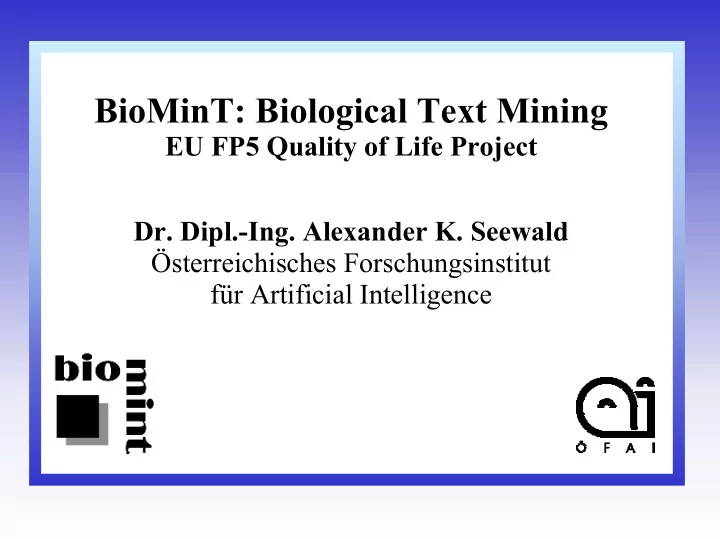

BioMinT: Biological Text Mining EU FP5 Quality of Life Project Dr. Dipl.-Ing. Alexander K. Seewald Österreichisches Forschungsinstitut für Artificial Intelligence
Motivation “Economic and business pressures are forcing drug companies to deploy computing, but there are still gaps between what users want and what can be achieved .” (Peter Rees - Scientific computing world - Jul/Aug 2003) “To be honest I don’t really understand why you can’t buy more [off-the shelf bioinformatics software].” (Jim Fickett, global director bioinformatics, AstraZeneca - Scientific Computing World, Jul/Aug 2003) “What might help is if the [bioinformatics] manufacturers have the scientists’ needs in mind .” (Michael Man, Pfizer - Genome Technology, Jan 2003) Alexander K. Seewald 2 alex@seewald.at / alex.seewald.at
Background Current frontier is biological text mining = finding research papers, extracting topics, ranking by relevance, extracting metabolic pathways... • Still in its infancy • Biology is hard domain for general text mining • Chronic lack of large training corpora • "Access is a bigger problem than algorithms" So, we concentrate on a small user group with clear requirements and address these issues. Alexander K. Seewald 3 alex@seewald.at / alex.seewald.at
BioMinT: Biological Text Mining Research project funded by the EU (2003 – 2005) • develop a generic text mining tool for content-based and knowledge-intensive information retrieval and extraction • to be applied to the annotation of the Swiss-Prot and PRINTS proteomics databases with information mined from scientific papers; and to generate human-readable reports • adapted to the needs of biological researchers in general and specifically for SwissProt / PRINTS annotation. = In-silico research / curator assistant www.biomint.org Alexander K. Seewald 4 alex@seewald.at / alex.seewald.at
BioMinT Partners • University of Manchester(U.K), School of biological sciences – Prints and Precis providers • Swiss Institute of Bioinformatics – SwissProt providers and users • University of Antwerp (Belgium) – Language technology providers • Österreichisches Forschungsinstitut für AI (ÖFAI, Austria) – Information extraction/retrieval providers • University of Geneva (Swiss) – Information extraction/retrieval providers • PharmaDM (Belgium) – Relational data mining technology, architecture Alexander K. Seewald 5 alex@seewald.at / alex.seewald.at
Information Retrieval / Query Expansion A semantic meta-query engine built around legacy search engines of servers such as PubMed that operates in two steps 1) An expansion of the initial query with synonyms or related terms derived either from domain ontologies or from existing database entries. 2) A filtering and ranking of documents retrieved from these servers using task-specific heuristics. Alexander K. Seewald 6 alex@seewald.at / alex.seewald.at
Query Expansion: Synonym DB Download all 14 databases according to SIB (+ SwissProt) Extract all relevant fields from each DB separately Create all pairs of synonyms (noting Source DB, field, ID) 7,652,510 pairs of synonyms; 737,040 unique names 3250000 3000000 2750000 2500000 2250000 2000000 1750000 1500000 1250000 1000000 750000 500000 250000 0 Lo- Swiss Fly- GDB HUGO MGD OMIM RGD Ra t SGD TAIR Worm SubtiL- Ec- No.Entries cus Prot Base ma p Base ist oGen Unique Link Alexander K. Seewald 8 alex@seewald.at / alex.seewald.at
Named Entity Recognition… Positive-only comparison allows to recognize… • Competitive perf. of KeX & Yapex w/ sloppy comparison • Overlong matches of KeX All DEs Yapex KeX GAPSCORE Strict 0.202±0.401 0.097±0.296 0.192±0.394 PNP 0.606±0.423 0.529±0.374 0.629±0.414 Sloppy 0.732±0.443 0.775±0.420 0.761±0.427 Recent work • Competitive perf. of GAPSCORE vs. Yapex • Ensemble of all approaches improves on best single system Alexander K. Seewald 9 alex@seewald.at / alex.seewald.at
Learning Large Training Corpora… Learning approaches on top 20 species • 75.5% Human domain expert • 79.6% Mapping MeSH Terms to species • 88.9% JRip Rule Learner, 172 rules • 89.3% support vector machine (SMO) Conclusion • Domain experts are good at creating precise rules, but bad at managing trade-off • JRip is good at managing trade-off, but yields worse precision offset by better recall. Alexander K. Seewald 10 alex@seewald.at / alex.seewald.at
Related Research TextPresso: Question answering • Small domain with simple nomenclature (C. elegans) • Corpus of 2,700 full-text papers and 16,000 abstracts • Open-Source, freely available search: www.textpresso.org QUOSA: Query, Organize, Share, Analyze • Commercial product, launched late 2002 • Establishes local paper collection by downloading • Prioritizes full-text papers during search • Available to hundreds of researchers in two US hospitals Alexander K. Seewald 11 alex@seewald.at / alex.seewald.at
Future Work • Generating better PubMed queries • Filtering and Ranking documents • User-interface improvements • Bootstrap human-generated corpora • Beat (or join) competition Alexander K. Seewald 12 alex@seewald.at / alex.seewald.at
Acknowledgments • Terry Attwood, Alex Mitchell, Paul Bradley, Peter Bracken (University of Manchester) • Luc Dehaspe, Andre Vandecandelaere, Kristof van Belleghem (PharmaDM) • Johann Petrak (ÖFAI) • Anne-Lise Veuthey, Violaine Pillet, Marc Zehnder, Pavel Dobrokhotov (SIB) • Walter Daelemans, Frederik Durant, Fien De Meulder (CNTS, University of Antwerp) • Melanie Hilario, Jee-Hyub Kim (University of Geneva) Alexander K. Seewald 13 alex@seewald.at / alex.seewald.at
Recommend
More recommend